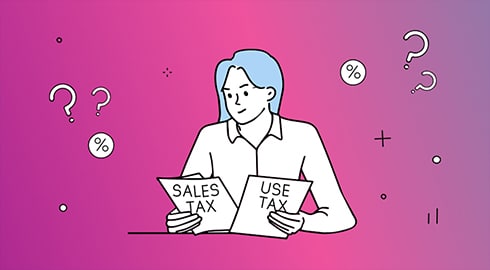Sales tax compliance is a crucial part of every business … including the often exempt professional service providers. Yet, many businesses in the professional services industry may not be fully aware of their sales tax responsibilities and the potential risks associated with non-compliance.
But what’s the history behind these exemptions? Why aren’t professional services exempt across all states? And what steps can be taken to protect you from non-compliance?
Let’s find out.
Understanding sales tax for professional services
Professional service providers, including attorneys, physicians, accountants, and other licensed professionals, enjoy exemptions from sales tax in many states. This favorable treatment stems from the recognition that these services contribute to the public welfare and should not be subject to the same tax burden as tangible goods.
The reason for this exemption stems back to the intangible nature of professional services. Unlike tangible goods that can be bought and sold, professional services involve specialized knowledge, expertise, and personalized assistance tailored to individual clients.
By exempting professional services from sales tax, states aim to promote access to necessary professional expertise while avoiding potential economic burdens on service recipients. These services are seen as an essential catalyst for the economy to be able to sustain itself. And how can you tax something so vital to the economy?
But here’s the catch: Not all states agree on this sales tax exemption.
Hawaii, South Dakota, and New Mexico all tax services by default, and this includes professional services. So if you’ve triggered an economic nexus in one of these states, or have a physical presence there, you need to collect and remit sales tax.
In the remaining 46 states, professional services are taxed uniquely according to each state’s tax laws. Which means that it’s not only your nexus that determines your tax obligation, but the way the applicable state approaches your specific service field.
So what are the most common challenges and pitfalls that professional service businesses need to be aware of?
Common pitfalls and the speed of non-compliance
While professional service providers may be exempt from sales tax in many states, there are common pitfalls and non-compliance issues that can arise, leading to potential legal and financial consequences. It’s important for service providers to be aware of these challenges and take proactive measures to ensure compliance.
Cross-state and bundled services
A common pitfall is the unintentional provision of a taxable service in a state that approaches sales tax differently to your home state. The complexity can increase when a service provider starts selling taxable goods as part of their service, such as a lawyer who also sells books on legal advice from their office. These bundled services can easily create confusion and lead to exposure.
Proving your exemption
The general tax exemption that professional services enjoy can lead to a laxness on the documentation front. Companies need to remember that their exempt status needs to be substantiated when an audit comes around. To do this they need to obtain the required exemption certificates from each state they do business in and keep record of all applicable documents.
Keeping track of your nexus
For companies operating within a single state, nexus is easy to keep track of. But as soon as you start crossing state lines and offering services to clients in different tax jurisdictions, keeping track of your nexus can be tricky as each state has different thresholds and exemptions.
Filing sales tax returns
Another dire misconception comes into play when tax return season comes around. Professional services companies may be exempt from collecting and remitting sales tax, but that doesn’t mean they don’t have to file a sales tax return. Exempt companies still need to file a “zero tax due” sales tax return and report on their non-taxable activity and transactions.
So how do you address these challenges and avoid the pitfalls that can easily plague a professional service business’s path?
Best practices for sales tax compliance
To maintain sales tax compliance as a professional service provider, it’s crucial to implement effective practices that mitigate the risk of non-compliance. By following these best practices, you can ensure that your business meets its sales tax obligations while minimizing the potential for errors or oversights.
Stay informed in an evolving landscape
Stay updated on sales tax laws, regulations, and exemptions applicable to your industry and the states where you operate. Regularly review tax authority websites, attend seminars, and consult with tax professionals to stay informed about any changes that may impact your business.
Maintain up to date and accurate records
Keep detailed and organized records of all sales transactions, including invoices, receipts, and supporting documentation. Accurate records are essential for proper sales tax calculation, reporting, and audit defense.
Understand multi-state nexus requirements
Understand the concept of nexus, which determines the presence of sufficient connection or activity in a state to establish sales tax obligations. Be aware of the nexus rules in each state where you provide services and assess whether you have an obligation to collect and remit sales tax.
Implement automated solutions
Each of the previous steps are labor-intensive and require dedicated attention to get right. The only way to make them part of your journey is to utilize sales tax automation software or services that can streamline your sales tax processes, from tax calculation to reporting, to collecting and remitting sales tax automatically. Automation reduces errors, ensures accurate tax calculations, and simplifies compliance tasks.
Complyt: giving you the professional service you need for a change
As the catalyst that keeps so many industries running smoothly and effectively, Complyt offers you the professional service you need for a change.
What we offer is confident compliance with zero manual tasks. The Complyt platform integrates seamlessly into your existing tech stack, monitoring every transaction and keeping record of exemption certificates at all times.
Complyt also keeps track of tax law changes across 12,000+ jurisdictions, updating your dashboard and sales tax processes according to new nexus events that may have been triggered without your knowledge.
Get in touch with us to see how Complyt can keep your exemption compliant at all times.









